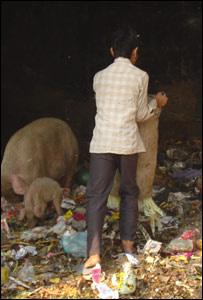India toilet cleaners stage protest over conditions
- Published

Manual scavenging is supposed to have been banned
Hundreds of Indian workers employed to manually clean non-flush toilets have protested in Delhi against their working conditions.
They say that the authorities have failed to act despite declaring such work illegal, and should issue an apology for decades of discrimination.
Government figures suggest that about 300,000 low-caste Dalits are still employed in such work.
They are estimated on average to earn less than $4 (ÂĢ2.50) a month.
The demonstrators began their protests a month ago by criss-crossing the country to highlight their demands.
Manual "scavenging" - removing human excreta from dry or non-flush toilets - is a centuries-old practice in India.
It is mainly carried out by the Dalits, formerly known as the untouchables, who are at the lowest rung of the Hindu caste system.
They go from house to house every morning to collect night soil, a euphemism for human faeces.
Although manual scavenging is prohibited by law, some government departments still have such workers. These include the railways ministry, which employs people to clean railway tracks as most trains have open-discharge toilets.
Government figures show there are more than 300,000 manual scavengers in India, but unofficial estimates put the number at more than one million.
The organisers of the protest say they want the government to completely eradicate the practice and rehabilitate those engaged in it.
They say that there will be a countrywide protest from November if the government fails to meet their demands.